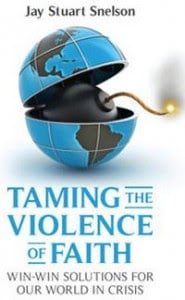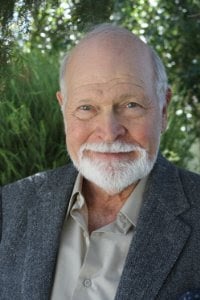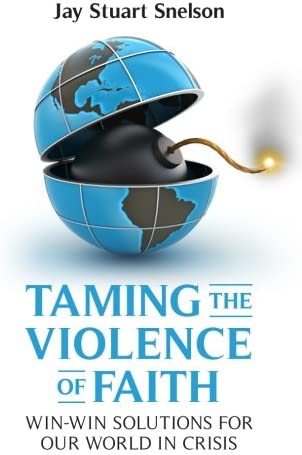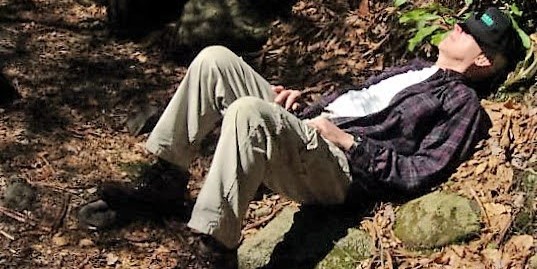
"The world today is not so gay. Fighting and bickering all the way. Who knows when war may start and tear this mad old world apart? Some men fight to show their might; others still for the want to kill. If countries shall make war again, I promise you, no one will win."
That little poem, entitled "A Losing Fight" was written by Jay Stuart Snelson when he was a mere 8th grader back in 1950 Los Angeles. And it has been rattling around my head all week as I contemplated today's anniversary of the 911 terrorist strikes.
Those simple words written by a 14 year old, sent me back to reading the more complex words he wrote as an adult, in "Taming the Violence of Faith". The book was published in early 2012 just a few months after his death at the age of 75. As I began re-reading his book, while thinking of 911, I was reminded of both the complexity of human violence and the simplicity of the alternative. Of course, as Steve Jobs reminded us, “simple can be harder than complex.”

Foreshadowed in Jay’s teenage poem and developed more fully in his adult writing, he clearly realized the escalated killing power inherent in the introduction of nuclear and other weapons of mass destruction. In “Taming the Violence of Faith”, he discussed the history of violence and war over the centuries; tracing how it moved from a one on one, or one on few form of destruction, from which the human race could always survive and recover via procreation, to the modern and very real possibility of mass destruction made feasible with newer weapon systems for which survival and recovery by the human race remains highly suspect.
Even with the dramatic reduction from a peak of almost 70,000 active nuclear weapons in 1985, the triggering of less than 1% of today’s remaining 17,000 nuclear warheads is estimated to be enough to induce an end-game, global, nuclear winter. And even if there were no nuclear option, weapons of mass destruction, from bio-chemical to hijacked airliners, pose a one to massive killing potential, as we recall with solemn certainty on this very day.
Jay’s writing pondered why the very same people who are aghast at dis-organized-violence, the often random acts of violence that happen in everyday life played out on the news and social media, can simultaneously be pro-organized-violence in the name of a religious or political doctrine.
Personally, I am an advocate for a strong defense and I consider myself a peaceful person. Yet, I humbly recall the feeling and desire for retaliatory action, beyond defense, in the heat of 911. History tells us that is a typical response. And it almost always ends in more destruction followed by a seemingly-peaceful lull that belies the battle still broiling in the background.
History also tells us that the violence waged against the human race in the name of religion and politics goes back to nearly the dawn of our civilization. To illustrate, Jay quotes biblical examples of such horrendous violence that I found myself reaching for my bible to see if the brutality he quoted was truly written therein. It was.
- We have been conditioned to operate in a win-lose paradigm. For one to gain, others must lose. For one religion to be the true religion, others must perish. For one political agenda to be the truth, the others must be lies.
However, the science of observation would show us that it is not our human nature that drives this win-lose agenda, rather it’s our learned paradigms founded on imagination, rather than the actual observation, of causality. And in matters of causality, unless you are very lucky, action driven by what you imagine as opposed to what you can observe and know, generally leads to trouble. Any good problem solver knows that true root-cause analysis is always the first step in solving a problem. For even when your intentions are good, acting without causal understanding can prove disastrous. The universal law of unintended consequences always bites and yet, we continue to think it won’t.

Jay Stuart Snelson
|
As you ponder today's 911 anniversary and consider the turmoil the world is in across nearly every region, Jay would urge that the key challenge for each of us is to ask “can you identify, clarify, and verify which social causes lead to which social effects?”
“To follow a leader by default without verifying the equity, utility and morality of the leadership, through observational analysis, is to bury our heads in the sand and thereby risk human extinction.” Jay’s not with us today though his book “Taming the Violence of Faith” remains.
On this the 13th anniversary of 911, a simple prescription for our violent world, one which Jay would likely applaud as it cuts to the heart of the root-cause issue, actually comes to us from readings of faith; simply, "love your neighbor as yourself."
May peace be with you as we all reflect on the loss and lessons of 911.

 "The world today is not so gay. Fighting and bickering all the way. Who knows when war may start and tear this mad old world apart? Some men fight to show their might; others still for the want to kill. If countries shall make war again, I promise you, no one will win."
"The world today is not so gay. Fighting and bickering all the way. Who knows when war may start and tear this mad old world apart? Some men fight to show their might; others still for the want to kill. If countries shall make war again, I promise you, no one will win." Foreshadowed in Jay’s teenage poem and developed more fully in his adult writing, he clearly realized the escalated killing power inherent in the introduction of nuclear and other weapons of mass destruction. In “Taming the Violence of Faith”, he discussed the history of violence and war over the centuries; tracing how it moved from a one on one, or one on few form of destruction, from which the human race could always survive and recover via procreation, to the modern and very real possibility of mass destruction made feasible with newer weapon systems for which survival and recovery by the human race remains highly suspect.
Foreshadowed in Jay’s teenage poem and developed more fully in his adult writing, he clearly realized the escalated killing power inherent in the introduction of nuclear and other weapons of mass destruction. In “Taming the Violence of Faith”, he discussed the history of violence and war over the centuries; tracing how it moved from a one on one, or one on few form of destruction, from which the human race could always survive and recover via procreation, to the modern and very real possibility of mass destruction made feasible with newer weapon systems for which survival and recovery by the human race remains highly suspect.


